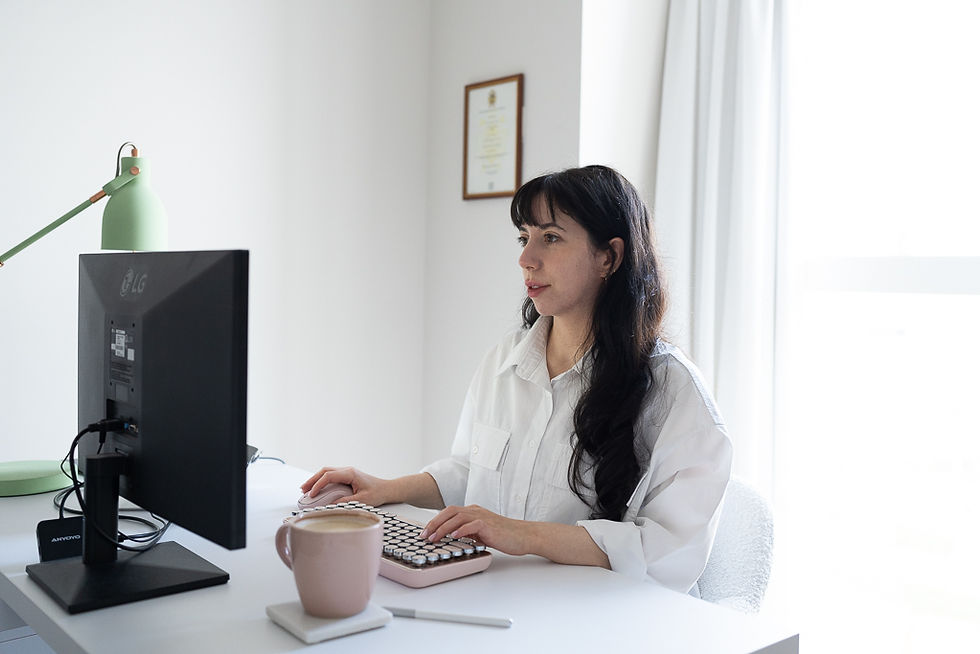How Coaching Can Help You Feel Confident and Prepared for Job Interviews
- Beverley
- Oct 21, 2025
- 4 min read
Updated: 1 day ago

Job interviews can feel nerve-wracking - even for experienced professionals. You might find yourself overthinking answers, doubting your experience, or replaying every question afterwards. If that sounds familiar, job interview coaching can be a powerful way to shift your mindset, reconnect with your strengths, and show up with confidence.
In this post, I'll answer some of the most common questions people ask about how coaching can help you to feel confident and prepared for job interviews.
How can coaching help me perform better in job interviews?
Coaching helps you uncover what's really getting in the way of performing at your best. Whether that's nerves, self-doubt, or unclear messaging. Instead of memorising answers, you'll learn to express your experience naturally and confidently.
Through coaching we explore:
What confidence looks and feels like for you
How to reframe unhelpful thoughts
How to connect your answers to your values and achievements
As a result, you show up calmer, clearer, and more authentic - which interviewers notice immediately.
What's the difference between job interview coaching and general career coaching?
Career coaching is broader. It helps you reflect on where you are, what you want next, and what changes might help you feel more fulfilled.
Job interview coaching is more focused. It zooms in on how you present yourself. From structuring answers to managing nerves and building presence.
In practice, they often overlap and many people come for interview support and end up gaining career clarity on the way. When you know what matters to you and what you bring, interviews become much easier.
What happens in an interview coaching session?
Every session looks a little different depending on your needs, but job interview coaching is always a mix of reflection, practice, and feedback.
Unlike general coaching, where I don't offer advice or direction, interview coaching involves a slightly more interactive and practical approach. I'll still use coaching questions to help you explore your mindset, build confidence, and identify your strengths. But I'll also offer targeted feedback and techniques to help you perform at your best.
Here's what that might look like:
Clarity and Confidence
We start by understanding where you are. How you feel about interviews, what's been challenging, and what success looks like for you. You might be surprised how powerful it is to pause and reflect on what's really behind the nerves or self-doubt.
Storytelling and Structure
Next, we explore how to talk about your experience clearly and naturally. I'll help you identify key examples from your career and shape them into confident, structured answers, without sounding robotic or over-rehearsed.
Practice with Feedback
Then we start practicing answering common questions out loud. I'll listen to what you say and how you say it, then give constructive, encouraging feedback. This includes looking at strengths, clarity, tone, and body language. It's not about memorising answers, but about helping you express yourself with confidence and ease.
Mindset and Reflection
Throughout, we look at your mindset. What helps you feel calm and composed, and what habits or thoughts might be holding you back. I'll share tools and frameworks to help you manage nerves and build self-trust for the real thing. Each session is designed to build both confidence and competence, so you leave feeling more prepared and more grounded.
How can I change the way I talk to myself before and after interviews?
The way you speak to yourself has a huge impact on how you perform. If your inner voice is full of criticism ("I'm terrible at interviews", "I don't deserve this job", "They won't pick me"), of course your confidence will dip.
In coaching, we explore how to shift that voice, replacing judgement with curiosity and self-encouragement.
For example:
Instead of "I always mess up", try "What went well last time, and what can I learn?"
Instead of, "I need to be perfect", try "I just need to connect and communicate clearly."
Small shifts like these build resilience, calm, and confidence over time.
What small mindset shifts make the biggest difference in interview performance?
Here are three that come up often in my sessions:
From proving yourself > to sharing your value. You're not under interrogation. You're having a conversation about fit.
From perfection > to connection. Interviewers remember your energy and clarity more than exact wording.
From fear > to curiosity. Instead of worrying about the outcome, stay curious about what you can learn from the process.
These small changes can transform the whole experience, helping you walk into interviews feeling composed, capable, and ready to show your best self.
Coaching isn't about rehearsing answers. It's about helping you believe in them. It gives you the space to reflect, practise, and build the kind of confidence that feels natural, not forced.
Next Steps:
If interviews leave you feeling nervous, uncertain, or frustrated, you're not alone. Many of my clients come to coaching feeling exactly the same. They were capable professionals who just needed to rebuild confidence, find their voice, and approach interviews with calm and confidence.
Together we focus on practical tools to help you:
Build confidence in how you speak about yourself and your achievements
Develop clear, natural answers that highlight your strengths
Manage nerves and shift your mindset before, during, and after interviews
You don't need to have everything figured out. You just need space, support, and tools that help you perform at your best.
Not sure if coaching is right for you?
Start with a one-hour mini coaching session to get clarity, practical guidance, and clear next steps. No pressure, just focused support.



Comments